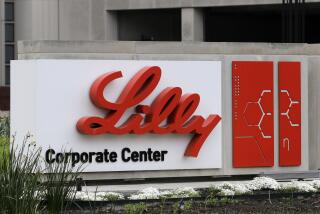Claim That Drug Slows Gehrig’s Disease Disputed
- Share via
California-based researchers reported Monday that a new drug slows the neurological decline of patients with amyotrophic lateral sclerosis, better known as Lou Gehrig’s disease, but a prominent specialist raised questions about the work’s validity.
A team from California Pacific Medical Center in San Francisco said daily injections of insulin-like growth factor-1, or IGF-1, slowed patients’ deterioration in movement and speech by 25%.
The drug’s maker, Cephalon Inc. of Woodland Hills, released the findings first to a group of stock analysts, then at a news conference in New York.
“The thing that keeps patients going is hope. This is validation of that hope,” said Lynn Klein, a vice president of the ALS Assn.
But one prominent neurologist, Dr. Leon Charash, harshly criticized the study as well as its release before publication in a medical journal.
Charash, chairman of the Muscular Dystrophy Assn.’s medical advisory committee, said the study is flawed because some participants might have been able to figure out who got the drug and who got a placebo, in violation of research guidelines.
Besides, he said, the drug’s benefits are at best modest, adding perhaps six months to the lives of people otherwise expected to live for two years. The Muscular Dystrophy Assn. sponsors research into Lou Gehrig’s Disease.
The criticism angered Frank Baldino Jr., Cephalon’s president. He said that the study was done in line with accepted guidelines and that adding six months to the lives of patients is a significant advance.
In response to Charash’s criticism about releasing the findings before publishing them, Baldino said government regulations require him to disclose information that could affect the company’s financial status.
Minutes after the news conference, Cephalon stock soared to more than $20 on the Nasdaq exchange, doubling in value. It closed at 18 3/8, up 7 7/8.






